Vote Compass is an online tool where you answer thirty questions and it tells you what political parties you’re most aligned with.
We break down the insight it’s given us into how different generations think about the big issues in Aotearoa.
Across the election over 600,000 New Zealanders have used Vote Compass, sharing their thoughts on issues like cost of living, climate change, and health.
You can still use the tool right up until the election, check it out here.
While the tool is completely anonymous, respondents share their age, which gives us insight into how different age groups think about these issues.
We broke down a range of questions by age demographic responses and discussed the results with Victoria University of Wellington political scientist Lara Greaves.
She shared her six big takeaways on what the data might tell us about how the generational divide impacts the culture and politics of Aotearoa.
*Note: Each question in Vote Compass is broken down into six options: strongly disagree, somewhat disagree, neutral, somewhat agree, strongly agree, and don’t know.
In this article, when we refer to stats about the percentage of respondents who agree, we have combined the “strongly agree” and “somewhat agree” responses, and likewise for disagree, we have combined “strongly disagree” and “somewhat disagree”.
However for the infographics, in order to visualise the data clearly and simply, we have displayed just the “strongly” options.
NZ’s boomers are less socially conservative than overseas
Vote Compass results show that New Zealanders aged 65+, commonly called baby boomers, are less conservative than the same age group overseas, Greaves says.
“We put that down to protest movements in the 70s and 80’s like the Springbok tour, and abortion, Māori and women’s rights movements.”
While older generations still tend to be more conservative in Aotearoa, the divide is much less clear than what can be seen in other countries, Greaves says.
“Normally what you see in other countries is a trend line where the youngest people are the most progressive, and baby boomers the least.
“We see less of a perfect line compared to other countries, like the UK.”
Greaves attributes part of this to our MMP political system, which separates out social and economic conservatism across different parties.
“We have more options in our political spectrum, giving people more ability to vote for people that represent them both economically and socially.”
Greaves points to the boomers' response to Vote Compass questions about tax and Te Tiriti as an example of this.
On the question of ‘How much tax should corporations pay?’ and ‘How much should wealthier people pay in taxes?’, 71% and 70% of boomers agreed taxes should be higher, indicating that boomers may not be as economically conservative as you think.
Whereas, 54% of boomers thought Te Tiriti o Waitangi should have less of a role in New Zealand law, which may indicate half of boomers are socially conservative on this issue.
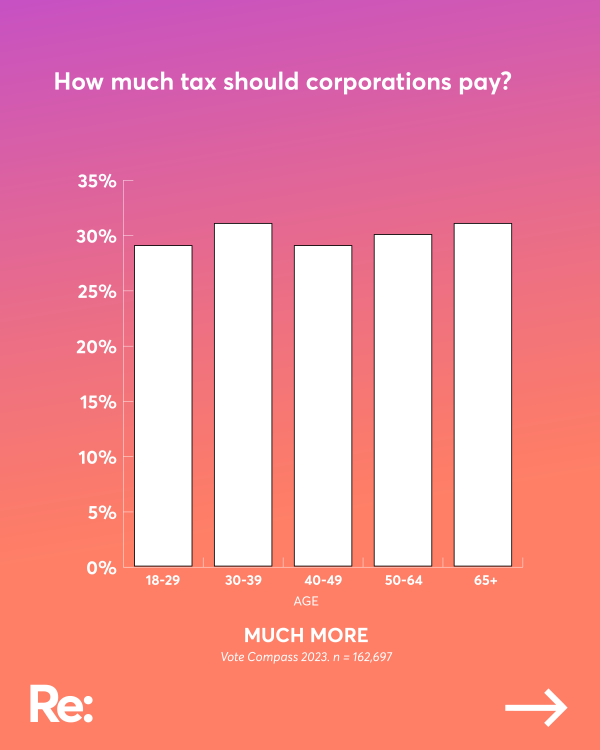
There is a very conservative group within Gen Z that might be bigger than we think
The current age of Gen Z is 11 to 26 years old - which is best represented by the 18-29 demographic within Vote Compass.
Research has shown there is a very conservative group within Gen Z, Greaves says.
“There’s a group that are quite anti-Māori, anti-women, and socially conservative.”
A possible explanation for this socially conservative group within Gen Z are online communities surrounding influencers such as Andrew Tate, Greaves says.
Some results from Vote Compass might indicate this group is bigger than expected, she says.
A possible example of this is Gen Z’s response to the question ‘Laws against hate speech would place too many limits on freedom of expression’, Greaves says.
Gen Z respondents agreed with this more than any other age group, at 40%. They were closely followed by boomers at 39%.
The older the voter, the more likely they are to follow the news
The responses to the question ‘Fruits and vegetables should be exempt from GST’ indicates boomers are more engaged with political commentary and news, Greaves says.
While the majority of respondents agreed with this idea, 41% of boomers disagreed.
This policy has largely been discredited by economists because they expected supermarkets would absorb the savings instead of passing them on to customers, Greaves says.
She suspects the high proportion of boomers against this policy was based on their engagement with news where these flaws were discussed.
“Older people are more likely to be engaged with politics, following the commentary, and listening to what economists say.
“Older people might have had this context, and that's what we’re seeing here.”
Older people are more empathetic voters then they’re portrayed to be
Boomers are much more likely to be homeowners and landlords, but a large majority of boomer respondents agreed there should be a limit on rent increases.
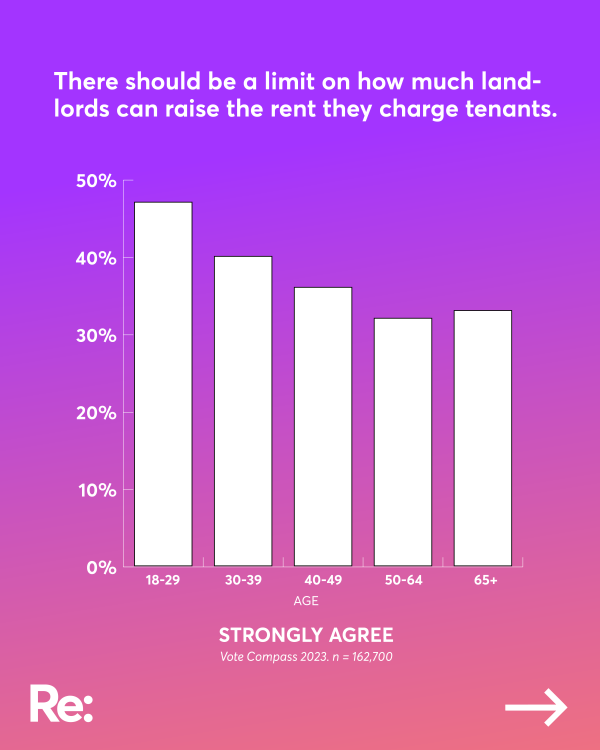
“The agreements we see on the renter question is pretty amazing - 70% of over 65+ think there should be a limit on it.”
Greaves says politicians often chase older votes by pitching policies that would benefit them, but results like this show older voters have a lot of reasons to care about policies that may not directly impact them, or even negatively impact them.
“Older generations are really concerned about the younger generations. They are parents and grandparents, they have younger people in their lives and they want them to have healthy, affordable housing.”
Another example of this is 43% of boomers thinking the minimum wage should be raised.
Young people support Māori rights much more
For questions relating to Māori issues, we see younger generations are more supportive of Māori rights whether they are Māori or not, Greaves says.
For the question ‘How much of a role should the Treaty of Waitangi have in New Zealand law?’ 40% of Gen Z respondents said more, compared to 54% of boomers who said less.
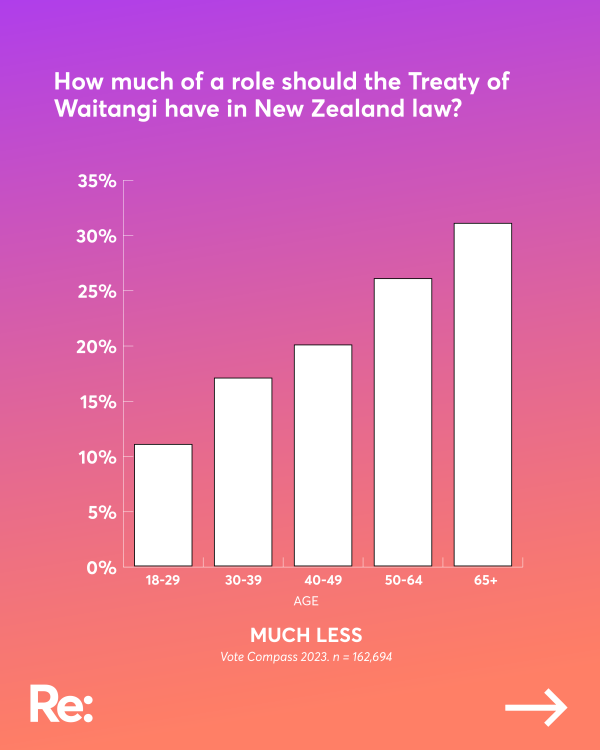
“I think it’s an exposure thing - young people are seeing and are engaged with more Māori rights and Māori culture,” Greaves says.
Since 2014, when Vote Compass first included this question, there has been an increase in support for this question. However, support has slightly dipped over the last three years.
In 2014, 15% of all respondents said the Treaty should play a larger role in New Zealand law. This increased to 27% by 2020. But it has dropped to 24% in this year’s Vote Compass.
This difference can also be seen in the question of whether New Zealand should change its name to Aotearoa.
73% of boomers disagreed.
While 45% of Gen Z also disagreed, they were also the demographic who showed the most support for the idea at 28%.
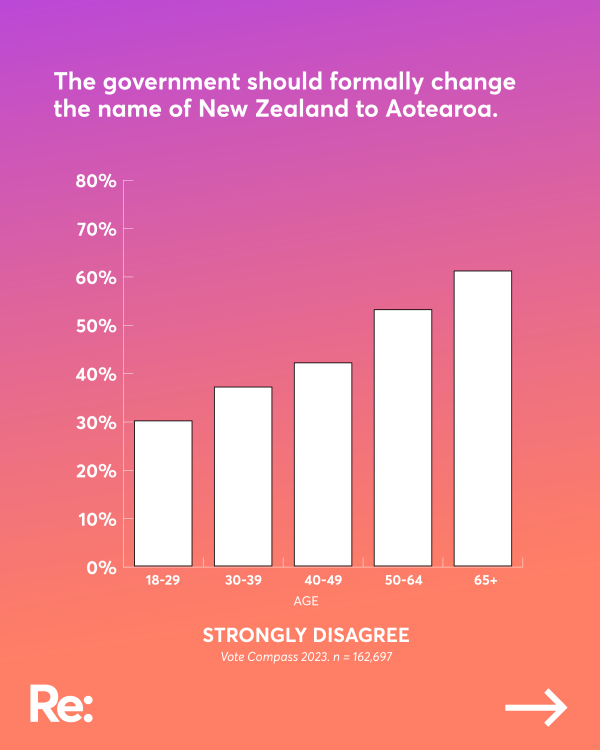
Young people feel way different about weed
One of the clearest divides between young and old people in the survey was about whether cannabis should be legalised, Greaves says.
There was strong support from Gen Z, at 65%, while 44% of boomers disagreed.
Greaves says the clear generational divide on this issue shows that there is likely to be another conversation about legalising cannabis in the future.
“It does seem to be a case of softening attitudes towards drugs over time.
“This is part of a larger liberalisation of attitudes and behaviour we’ve seen in our society. It’s the same sort of thing you see in attitudes towards sex and rainbow rights.”
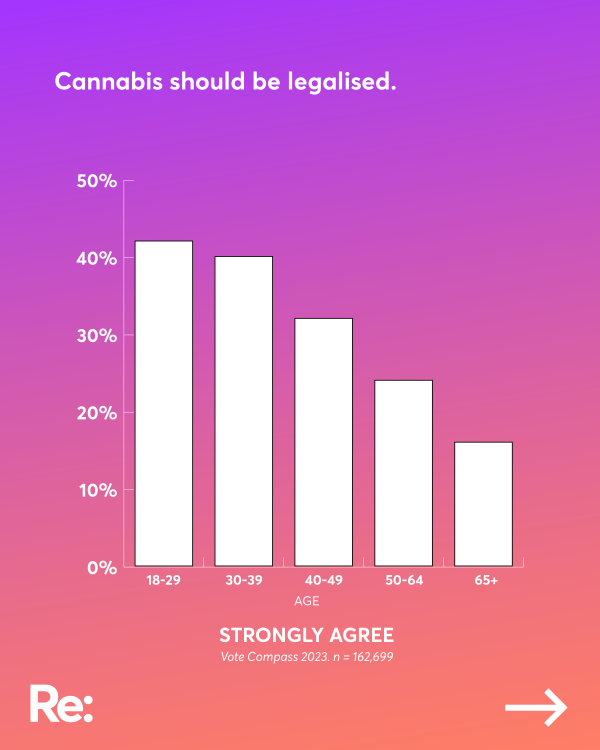
About Vote Compass and our results
Vote Compass was built as a partnership between TVNZ, New Zealand political scientists, and data science company Vox Pop Labs.
It's backed by the Electoral Commission as a way of driving voter engagement and is delivered in association with the University of Auckland and Victoria University.
As of writing, 600,965 New Zealanders had filled out the Vote Compass survey.
The results we shared are weighted, meaning the tool has made sure there is an even balance of factors such as gender, age and ethnicity represented in our results.
This is why the sample size in our examples is drawn from around 160,000 respondents rather than the full number of respondents to Vote Compass.
Check out our election policy breakdowns here:
Policy breakdown: Tax
Policy breakdown: Cost of living
Policy breakdown: Rainbow rights
Policy breakdown: Education
Policy breakdown: Climate Change
And some of our other election coverage:
On trans rights, here’s stats on the situation, and what young voters think.
On cost of living, here’s stats on the situation, and what young voters think.
On climate change, here’s stats on the situation, and what young voters think.
On dental health, here’s stats on the situation, and what young voters think.
On youth crime, here’s stats on the situation, and what young voters think.
On truancy, here’s stats on the situation, and what young voters think.